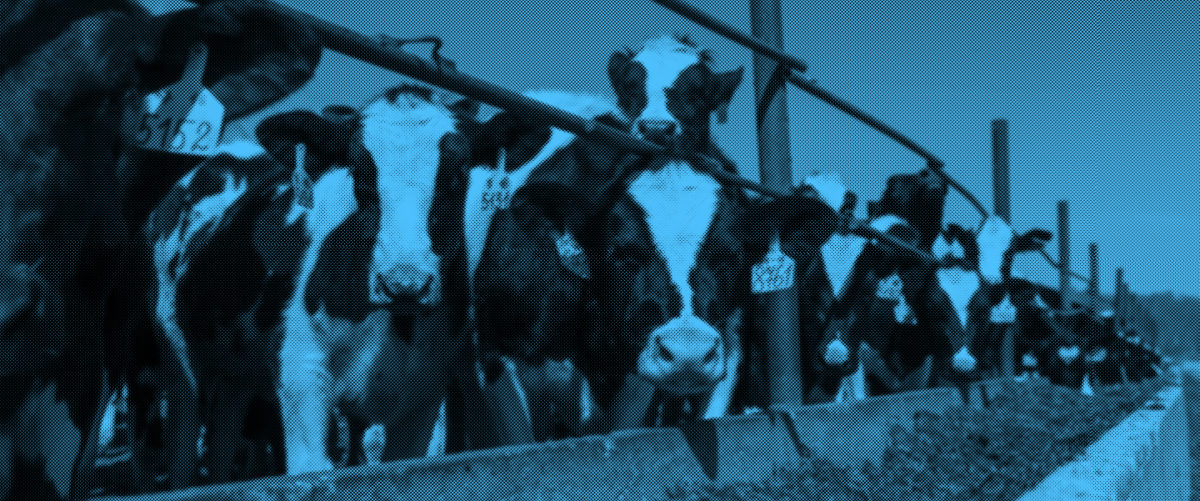Is Oregon Environmentally Friendly? Governor Brown’s Inaction Casts Doubt.
Published May 6, 2021

Mega-dairies threaten Oregonians’ way of life, but Governor Kate Brown is silent on bills that could reform them. That speaks volumes.
Oregon has a reputation as a progressive and environmentally friendly state. In reality, however, it has a dirty factory farming problem that is polluting its rivers, streams, and groundwater, threatening public health in rural communities and contributing to climate chaos. This legislative session we made progress towards stopping an expansion of these mega-dairies, but bold action is needed from Governor Kate Brown to combat this growing problem.
The Transition Away From Family Farms In Oregon Has Been Disastrous
Oregon has long been a dairy state, and small and mid-sized farms have been a lifeblood of rural Oregon. But while the number of dairy cows in the state increased fourteen fold between 2007 and 2017, those cows are largely concentrated in enormous operations with thousands or even tens of thousands of cows. The resulting flood of cheap milk has made it difficult for small and mid-sized family farmers to compete, forcing them out of business. This rapid transition from family farms to mega-dairies has been a disaster for Oregon’s communities and environment.
In 2019 alone, large dairies in Oregon produced almost 6.5 billion pounds of manure — twice the waste produced by the entire Portland metropolitan area’s more than 2 million residents. But while waste from Portland residents is treated, mega-dairies dump their waste into large “lagoons,” where it can leach into drinking water aquifers. They then dispose of it — untreated — on cropland, often in far greater quantities than can be absorbed by crops. This results in runoff into local waterways that threatens aquatic ecosystems and recreation with pathogens, pharmaceuticals, and algae-causing nutrients.
Oregon’s Mega-Dairies Are A Significant Contributor To Climate Change
Mega-dairies also drive climate change by emitting huge amounts of methane, a greenhouse gas 86 times more powerful than carbon dioxide in the first 20 years it’s in the atmosphere. Corresponding with an explosion of factory farming across the country, U.S. methane emissions from manure management increased 60% between 1990 and 2018. Just as we cannot afford to keep expanding fossil fuel production, we cannot afford to keep building new factory farms.
That’s why Food & Water Watch is working with the Stand Up to Factory Farms (SUFF) coalition, a diverse range of organizations committed to stopping the spread of mega-dairies across Oregon.
Governor Kate Brown Fails The Leadership Test On Our Mega-Dairy Moratorium Bill
In 2019 SUFF first introduced legislation to place a moratorium on mega-dairy expansion in the Oregon Senate. In the two years since, our campaign’s momentum has grown, and in the 2021 session we got our bill introduced in both houses with an increased number of sponsors. Our bill was scheduled for a hearing in the Senate Committee on Energy and Environment, and we organized to pressure chair Lee Beyer to move the bill out of committee. Despite hundreds of calls and emails to Beyer’s office and over 130 people submitting testimony in favor of the bill (with only 16 against), Beyer refused to schedule the bill for the required work session in order to pass it out of committee.
Governor Kate Brown, who has the authority to unilaterally put a pause on approval of mega-dairies, was silent on the bill, despite her call for bold actions to combat climate change “in all policy decisions.” She clearly continues to look the other way when it comes to factory farms.
Kate Brown’s Pattern Of Inaction When It Comes To Mega-Dairy Scandals
Take for instance the specific permit application currently pending before her Department of Agriculture by Easterday Dairy. Easterday is an entity with no dairy experience, yet seeks to operate a 30,000 head mega-dairy on the site of the disastrous Lost Valley Farm. Lost Valley was cited with over 200 environmental violations including overflowing lagoons that threatened water supplies. Only after pressure by Food & Water Watch and our allies in SUFF, the state finally revoked its permit in 2018.
Oregon regulators and elected officials have claimed that Lost Valley was simply one bad actor, but recent events have proven that to be false: the Easterday family and its companies were recently caught up in a modern day cattle rustling scandal, and Cody Easterday recently pled guilty to federal fraud charges for ripping off Tyson Foods for the feed and care of cattle that didn’t actually exist — to the tune of $244 million. Two of Easterday’s companies have declared bankruptcy, and Cody Easterday could face up to 20 years in prison. Was Lost Valley Farm a lone bad actor? Clearly not.
Brown’s response to these huge red flags? Her administration has “paused” processing the Easterday permit, but has remarkably refused to deny it outright despite clear authority — and good reason — to do so.
Help Motivate Governor Brown To Do Right When It Comes To Easterday And More
Oregonians need real leadership from Governor Brown. Between now and the next legislative session, we’ll be working with our allies across the state to continue to build an even more powerful movement to stop mega-dairies in the state — demanding both the Governor and legislative leaders stop giving this polluting industry a free pass. If Governor Brown is serious about addressing the climate crisis, she must use the power of her office to stop the expansion of these dirty factory farms and support our small and mid-sized farmers. And she must order the Oregon Department of Agriculture to deny the Easterday Farms mega-dairy permit outright to prevent another disaster like Lost Valley.
Urge Governor Kate Brown to deny permitting to Easterday Farms.
Enjoyed this article?
Sign up for updates.
TO TOP


